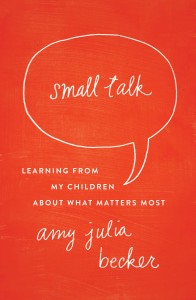I always appreciated the sentiment behind the Sabbath commands in the Bible, but it wasn’t until I had children, and rest became harder and harder to come by, that I wanted to take this idea of a Sabbath day seriously. It seemed to be the only thing that might get me to slow down. But it also felt nearly impossible. There was just so much to do. Resting, even in response to God’s gracious provision, seemed indulgent.
Over time, the idea of a day of rest slid from a commandment to an invitation. I read about people who let their dishes and clothes stay dirty on Sundays to give the earth a partial rest from our use of electricity and water, and to give themselves a rest from all those chores. I read about others who prepared all their food on Saturday and then invited people over for a Sunday feast to celebrate together. I didn’t put all these ideas into practice, but somehow, by taking seriously God’s command to rest on behalf of other people, I began to learn how to rest as an act of trust and worship and thanksgiving.
Years ago, I spent a summer babysitting a three-year-old and a seven-year-old. One afternoon, I took them to the pool. I don’t remember what happened to make the three-year-old, a little girl with long, curly blonde hair, erupt in tears. I just know that once she started wailing, I picked her up. She increased the volume of her screams and began to kick me. She thought I was trying to constrain her, when I only wanted to comfort her. I knew she couldn’t calm herself, and yet holding her seemed only to make things worse. As her cries became shrieks, I started to sing. Softly, in her ear. Gradually, she settled down. The arms that had been a prison to her became what they were meant to be — an embrace. She laid her head on my chest and cried until she finally felt better. And then I let her go.
I thought of that incident recently when I read Psalm 23 and my eyes fell on the words that begin the second verse: “He makes me lie down.” I remembered that little girl crying by the side of the pool. I remembered scooping her into my arms. Her resistance. My insistence. And eventually, her willingness to receive my care for her.
He makes me lie down. He makes me.
But Psalm 23 doesn’t end with God making the psalmist lie down. The action moves from he makes me to he leads me to he restores me to he guides me. It starts with God forcing the psalmist to take a rest, and it implies that the psalmist cannot “lie down” without God’s intervention. Once he has rested, though, he can move forward in the presence of the God who is a guide, a healer, a protector.
God is teaching me how to rest, but it is still a struggle. Like that little girl I held so many years ago, I resist the embrace at the same time that I long for it. I hold on to my plans, my insistence that there isn’t enough time, instead of turning with gratitude to the one who promises to hold on to me.
—————————————————————————————–
Amy Julia Becker is the author of Small Talk: Learning from My Children About What Matters Most (Zondervan), from which this essay is adapted.


















